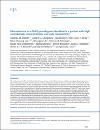Microdeletion in a FAAH pseudogene identified in a patient with high anandamide concentrations and pain insensitivity
| Author | Habib, Abdella M. |
| Author | Okorokov, Andrei L. |
| Author | Hill, Beta Matthew Nicholas |
| Author | Bras, Jose T. |
| Author | Lee, Man-Cheung |
| Author | Li, Shengnan |
| Author | Gossage, Samuel J. |
| Author | Drimmelen, Marie van |
| Author | Houlden, Henry H. |
| Author | Ramirez, Juan D. |
| Author | Bennett, David L.H. |
| Author | Srivastava, Devjit |
| Author | Cox, James J. |
| Available date | 2021-10-05T10:09:02Z |
| Publication Date | 2019-08 |
| Publication Name | British Journal of Anaesthesia |
| Identifier | http://dx.doi.org/10.1016/j.bja.2019.02.019 |
| Abstract | The study of rare families with inherited pain insensitivity can identify new human-validated analgesic drug targets. Here, a 66-yr-old female presented with nil requirement for postoperative analgesia after a normally painful orthopaedic hand surgery (trapeziectomy). Further investigations revealed a lifelong history of painless injuries, such as frequent cuts and burns, which were observed to heal quickly. We report the causative mutations for this new pain insensitivity disorder: the co-inheritance of (i) a microdeletion in dorsal root ganglia and brain-expressed pseudogene, FAAH-OUT, which we cloned from the fatty-acid amide hydrolase (FAAH) chromosomal region; and (ii) a common functional single-nucleotide polymorphism in FAAH conferring reduced expression and activity. Circulating concentrations of anandamide and related fatty-acid amides (palmitoylethanolamide and oleoylethanolamine) that are all normally degraded by FAAH were significantly elevated in peripheral blood compared with normal control carriers of the hypomorphic single-nucleotide polymorphism. The genetic findings and elevated circulating fatty-acid amides are consistent with a phenotype resulting from enhanced endocannabinoid signalling and a loss of function of FAAH. Our results highlight previously unknown complexity at the FAAH genomic locus involving the expression of FAAH-OUT, a novel pseudogene and long non-coding RNA. These data suggest new routes to develop FAAH-based analgesia by targeting of FAAH-OUT, which could significantly improve the treatment of postoperative pain and potentially chronic pain and anxiety disorders. |
| Language | en |
| Publisher | Elsevier |
| Subject | anandamide anxiolytic endocannabinoids pain insensitivity postoperative analgesia |
| Type | Article |
| Pagination | e249-e253 |
| Issue Number | 2 |
| Volume Number | 123 |
Check access options
Files in this item
This item appears in the following Collection(s)
-
Medicine Research [1292 items ]



